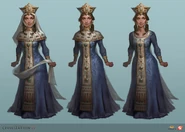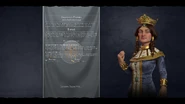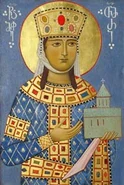- "Allow neither the wealth of the nobles nor the poverty of the masses to hinder your work."
Tamar the Great (c. 1160 – 18 January 1213) was the reigning King of Georgia from 1184 to 1213, presiding over the apex of the Georgian Golden Age. She leads the Georgians in Civilization VI: Rise and Fall.
Through faith and influence, Tamar is a fierce defender of both her homeland and the lesser states under her protection.
Intro
Fierce Tamar, only a fool could misjudge Georgia's true measure. Hound your enemies with loyal clansmen who strike from the hills. Encourage your foes to dash their best against your cities' enduring walls. The armies of your protectorates will run them down as they flee. If you suffer no fools, great queen, Georgia will not suffer.
In-Game
Tamar's unique agenda is called Narikala Fortress. She tries to fortify her cities with the most advanced Walls available and dislikes civilizations that do not keep their cities fortified.
Her leader ability is called Glory of the World, Kingdom and Faith. It provides the Georgians with a 100% ![]() Faith bonus for 10 turns after declaring a Protectorate War and a bonus
Faith bonus for 10 turns after declaring a Protectorate War and a bonus ![]() Envoy Envoy for each one they send to a city-state that follows their majority religion.
Envoy Envoy for each one they send to a city-state that follows their majority religion.
Detailed Approach
Securing a strong religion quickly is a must for Georgia. Gaining allies in neighboring city-states and spreading her religion there is a key advantage for Tamar in the war for religious dominance. Defending her city-state allies using the Protectorate War casus belli vastly strengthens her religious power, and in turn assures a strong influence there. Pride and achievements will bless her Georgia with a Golden Age that shines brighter than any other civilization. Use these important moments in time to slingshot Georgia ahead of the competition to an ultimate victory.
Lines
Tamar is voiced by Ana Makharadze. She speaks modern Georgian with some medieval stylization. For example, the plural form of "heart" in her Attacked line is გულნი (gulni) instead of the modern გულები (gulebi).
Voiced
Agenda-based Approval: I appreciate the walls you build for your people. You have a Georgian spirit. (მომწონს ესე კედელნი რომელნი ესე აღშენებულ არს შენი ხალხისათვის, გაქუს სული ქართველთა. / Momts'ons ese k'edelni romelni ese aghshenebul ars sheni khalkhisatvis, gakus suli kartvelta.)
Agenda-based Disapproval: Your people are too trusting. They'll let anyone into their cities—even barbarians. (შენი ხალხი ნამეტნავად დაჯერებულ არს, ბარბაროსებსაც უფლიათ შემოსვლა ქალაქებსა თვისა შინა. / Sheni khalkhi namet'navad dajerebul ars, barbarosebsats upliat shemosvla kalakebsa tvisa shina.)
Attacked: Georgian hearts will not tremble before your multitudes. (ნუ შეძრწუნდებიან გულნი ქართველთა სიმრავლესა მათისათვის. / Nu shedzrts'undebian gulni kartvelta simravlesa matisatvis.)
Declares War: God fights with us. You stand alone. (ღმერთი ჩვენთანა არს, თქვენ მარტოდ ხართ. / Ghmerti chventana ars, tkven mart'od khart.)
Defeated: Walls weren't enough to save Georgia from ruin. Neither was I. (კედელნი ზღუდისანი ვერ დახსნეს საქართველოი აოხრებითგან, უძლურვარ მეცა. / Edelni zghudisani ver dakhsnes sakartveloi aokhrebitgan, udzlurvar metsa.)
Greeting: I am Tamar of Georgia. Say what you will and be on your way. (მე ვარ თამარ, მეფე ყოვლისა საქართველოისა, სთქუ სიტყვაი შენი და განაგრძე სვლაი ესე შენნი. / Me var tamar, mepe q'ovlisa sakartveloisa, stku sit'q'vai sheni da ganagrdze svlai ese shenni.)
Quote from Civilopedia: Allow neither the wealth of the nobles nor the poverty of the masses to hinder your work. (ნუ უფლიეთ ნურცა მთავართა, ნურცა გლახაკთა ხელის შელვა. / Nu upliet nurtsa mtavarta, nurtsa glakhak’ta khelis shelva.)
[Note: The English line is a translation from her address to the clergy at a Church council she convened at the beginning of her reign[1] from the medieval chronicle The Life of Tamar, Queen of Queens, although the line spoken in Georgian is a back translation from English. (The original quote is ნუ თუალ-ახუამთ მთავართა სიმდიდრისათჳს, ნუცა გლახაკთა უდებჰყოფთ სიმცირისათჳს. / nu tual-akhuamt mtavarta simdidrisatŭis, nutsa glakhak’ta udebhq’opt simtsirisatŭis.[2] - "Do not show partiality to the mtavars because of their wealth, and do not neglect the destitute because of their poverty.")]
Unvoiced
Accepts a Trade Deal: It pains to me, but I must.
Rejects a Trade Deal: Try again. This time, with a real offer.
Delegation: Georgian merchants bring many strings of churchkhela. They make a filling dessert.
Accepts a Delegation: Your delegation did not cause an incident. I consider that a success.
Rejects a Delegation: Georgia has pressing matters. This is no time to host your merchants.
Accepts a Declaration of Friendship: I thought this is a cruel jest, but upon reflection, I notice your sincerity. Georgia agrees to your request.
Rejects a Declaration of Friendship: Friendship? Georgia is many things, but not one involves being your friend.
Requests Declaration of Friendship: You number amongst the few Georgia can trust. Should you agree, I will let it be known to all.
Denounced by Player: You are a detestable person. Your people deserve a better leader than you.
Denounces Player: To call you a thoughtless cur is an insult to curs.
Too Many Troops on Her Border: You test my patience with soldiers along Georgian borders. Remove them or they shall be removed.
Invitation to Capital: We should provide directions to our capitals so that we may deal with each other directly.
Invitation to City: I shall direct you to our capital. Behold our highly defensible tsikhe.
Civilopedia entry
The ideal monarch is wise, diplomatic, forward-thinking, a patron to the arts and cultures, and strong in defense of the realm. Few live up to this standard. Tamar, ruler of Georgia at the height of its golden age, matched this standard, even by the judgment of her enemies.
Tamar was born around 1160 (dates of her birth vary), to King George III of Georgia’s ancient and venerable Bagrationi dynasty (who claimed descent from the line of David, the biblical King of Israel) and Burdukhan, daughter of the King of Alania. Little is recorded of her early life.
Dynastic succession is touchy under the best of circumstances. As a woman, Tamar faced strong opposition from the nobles of the court, who preferred her cousin, Prince Demna. A rebellion of nobles favoring Demna broke out in 1177 and was crushed, and in 1178 Tamar was proclaimed heir and co-ruler by her father. When George III died in 1184, Tamar assumed the throne of a far-from-unified Georgia.
A complicated series of political intrigues resulted in Tamar being pressured into accepting the nobles’ choice for her husband: The Rus prince Yuri. The two were wed in 1185. Yuri was a decent enough soldier, and led Georgian forces to victory in battle, but he was a coarse and unpleasant person, and his entanglement in court politics did little to endear him to Tamar. So she filed divorce from him on grounds of drunkenness and immorality, and received her divorce from the ecclesiastical authority. It’s hard to overstate how big a deal this was, that the dynastic monarch of a fervently Christian nation would be able to divorce her husband and receive the go-ahead to remarry from the church and bishops.
Now began the period marking the greatest expansion of Georgia’s domain. The Georgians fought against the neighboring Muslim sultinates, aided by exceptional generals (including the new king consort, David Soslan) and conquered them. Nearby kingdoms became vassals and protectorates. Georgian nobles stopped scheming to overthrow or curtail Tamar’s power and rallied to her banners and took the field. Georgians even founded the Empire of Trebizond, injecting themselves into the powers of the Middle East.
Tamar's status as an eligible queen with a solidly-run kingdom made her the frequent target of marriage proposals, and one can easily imagine that after dealing with Yuri, most of these would have gone unwanted. One of the most famous stories of Tamar tells of how the Sultan of Rum declared war on Georgia, stating he would have Tamar "as a Muslim bride or a Christian concubine." The diplomat sent to deliver this message was summarily punched in the face by a Georgian courtier (one assumes with regal assent). The clear message had been sent to the Sultan of Rum.
Tamar, always pious, is said to have prayed at the cave city and monastery of Vardzia, then addressed her troops from the steps of the church. Inspired by her piety, the Georgians crushed the invaders and sent the Sultan of Rum from whence he came, perhaps to meditate on the basics of diplomacy.
Tamar was a strong patron of the arts and cultures. She bolstered trade and commerce, and minted coins bearing her monogram and titles. Laws were codified; churches and cathedrals were built. Georgian culture developed as a strong and lively syncretic blend of Byzantine Christianity and Persian-inspired ideas.
Tamar is said to have died in 1213, but her grave remains unknown. Some say she was secretly buried in a monastery, to prevent grave desecration. Others claim her remains were peregrinated to the Holy Land, for burial near the Holy Sepulchre.
She came to power in a divided kingdom, and left it larger, more powerful, and sure of its cultural identity. She is canonized as a saint in the Eastern Orthodox faith, and a national symbol for Georgians even today. None of her descendants could match the deeds of the greatest Monarch of Georgia.
Trivia
- Tamar's appearance in the final version of the game is different from her appearance in the early builds and promotional materials, which depicted her with darker skin.
- This was fixed in the final release due to concerns over historical inaccuracy from the Civilization community.
- Tamar's diplomacy screen shows a church overlooking a lake at the base of a mountain range.
- Tamar's leader ability is a title adscribed to her on coins and charters issued in her name, while her leader agenda is named after a fortress overlooking Tblisi, the capital of Georgia.
Gallery
Videos
Related achievements

|
Holy Righteous Queen Tamar
As Tamar, have every city-state in the game following the religion you founded.
|







